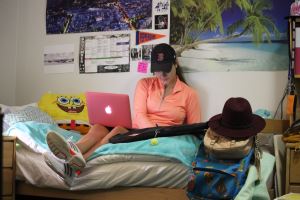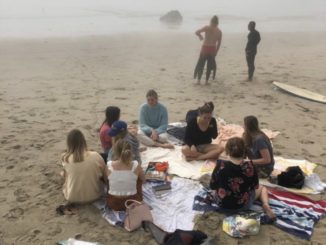
A peaceful, almost solemn atmosphere hangs over the second floor of the Payson Library. As 6 p.m. rolls around, students arrive in clusters, lifting the heavy mood. A once silent area fills with the laughter and camaraderie of a unique assembly of people: student-athletes.
They strain their bodies for around 20 hours a week. They travel, lift weights, watch films and play in high-intensity games. Despite these time-consuming activities, student-athletes must find a way to take care of business in the classroom.
Rachael Willett, academic coordinator of Pepperdine’s Athletics Academic Services, sits in a chair surrounded by students for Monday night study hall. They constantly approach her, asking about scheduling issues and meeting their requirements. All the while her phone lights up — signaling new texts with more concerns and questions.
Willett has been doing this job for one and a half years. As a former college basketball player, she said she understands what her student-athletes are going through. Her No. 1 concern is meeting them where they are at.
“Relationships are key with every job, especially this one,” Willett said.
She said the best way to get through to her students is by building legitimate relationships so that they are able to trust her. She knows most of the athletes personally.
All colleges are required by the NCAA to provide academic services to athletes, Willett said. Pepperdine University’s Athletics Academic Services work to “assist student-athletes with reaching their fullest academic and personal development,” according to the official website. Their services include scheduling assistance, tutoring and study hall.
Although Pepperdine student-athletes are doing well academically with a 94 percent graduation rate, they reported that success is a constant struggle. Study hall designates time outside of hectic practice and traveling schedules — but it is not always helpful.
Willett estimated that around 80 percent of her 250 athletes take advantage of tutoring and study hall, but all of them use the services for class registration. She attends conventions for the Model Practices Committee — which every academic adviser is a part of — to discuss the best practices.
Since Pepperdine doesn’t have a football team, a lot of potential funding is lost. Other schools have more money to put toward their services, Willett said. While she has to cover all of the athletes, schools like University of California Los Angeles have learning specialists broken down by sport.
Fortunately for Willett, Pepperdine recruits its athletes based on high academic standards. Their graduation rate puts Pepperdine’s student-athletes second in California, behind Stanford, for highest athlete graduation rates.
“This semester, no athlete is on probation, which is remarkable,” said Jim Hamad, associate director of Athletics for Student Development. “I’ve been here four and a half years and it’s never happened before.”
Pepperdine athletes have an average GPA around 3.0, Hamad said. He said they are enrolled in 16 or more units, so they are able to drop a class if their workload is unmanageable.
“All of our kids are recruited as students first,” swimming and diving Head Coach Nick Rodionoff said. He doesn’t require his athletes to attend study hall because “they know what’s required of them and they take care of business.”
His team is ranked 16th in the nation for highest GPAs. They are a Scholastic All-American team. Swimmers and divers carry about a 3.8 GPA coming in, Rodionoff said.
Coaches have their own prerogative when it comes to study hall and time spent practicing.
“Some coaches are really involved,” Willett said. Others leave it up to her and Hamad to check on their athletes.
Athletes have mixed views on the effectiveness of study hall, which is required for all incoming student-athletes and those who have a GPA below 2.5, according to Pepperdine’s AAS website.
Mandy Davis, a freshman on the women’s soccer team, said it is up to the individual whether study hall helps them or not.
“It can be helpful, but you also have the option of swiping your card, getting Jamba Juice and hanging out in the cafe,” Davis said.
Freshman women’s volleyball player Natalie Ridderig said study hall helps her until she runs out of work to do. When she goes there, she notices a lot of people on Facebook.
“People are either scrambling to get something done or doing nothing,” Ridderig said.
The men’s basketball team has their own team study halls in their coach’s office. Freshman basketball player Jett Raines said it is easier to become distracted in the regular study hall because no one is really watching.
In team study hall, “you focus because people watch over you to make sure you are quiet and stay off your phone,” Raines said.
Aaron Brown is a sophomore on the baseball team who is required to attend study hall. He believes the system of “earning your way out” with a high GPA is fair.
“I started as a freshman and was so focused on performing on the field that I didn’t take care of important things off the field,” Brown said.
Brown, who expects to get drafted within the next year, is one of the many Pepperdine athletes with intense practice and workout schedules. The NCAA sets a 20-hour limit on practicing per week, but this ends up being more after adding time spent lifting weights and watching film.
Davis’ soccer team has two-hour practices Tuesdays and Wednesdays, followed by weights. Thursday they have about an hour and a half of practice and also watch film. Saturday afternoons consist of more practice, and games are held Fridays and Sundays.
The majority of student-athletes miss classes due to traveling. Athletes find their own methods of staying caught up, including getting notes from friends or studying while on the bus.
“Our schedule was really bad this year; I missed a solid month of school,” Ridderig said. She estimated missing a total of 29 days of school, each of which had two classes. The only reason she was able to get notes was because she signed up for having a disability — attention deficit disorder.
“I have a funny relationship with my professors because they are more surprised when I’m in class than when I’m not there,” she said. “It’s like they think that I chose to miss their class.”
Freshman women’s basketball player Monet McNally misses public speaking and biology colloquium during weeks when she travels. One way she manages to stay ahead is by working with a tutor Willett provided.
Raines also takes advantage of one-on-one tutoring for his hardest class: calculus. Brown has two tutors who are especially helpful when the baseball team is traveling from Wednesday to late Sunday, causing him to miss four classes every away series.
Most student-athletes expect to graduate within four years, although for some this requires taking summer classes. The women’s basketball team will be training on campus in July, so McNally said she plans on taking one or two general education courses during that time.
As a computer science major, Raines said he will take summer classes as well to fit in everything he needs.
“I’m confident I’ll graduate in four years,” Raines said.
Sarah Barge completed this story in Dr. Christina Littlefield’s fall 2012 Jour 241 class.



